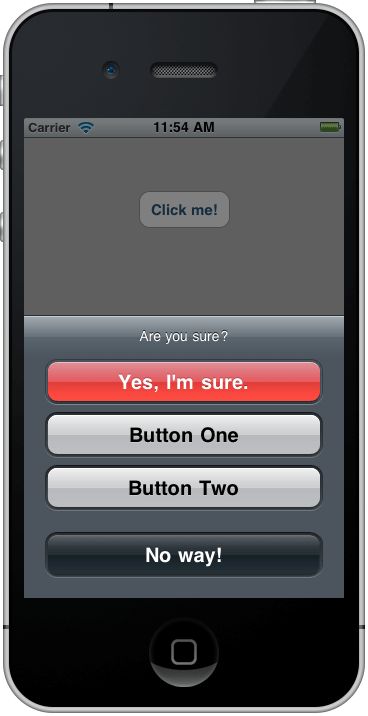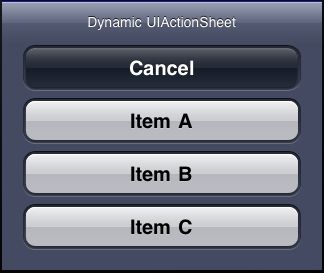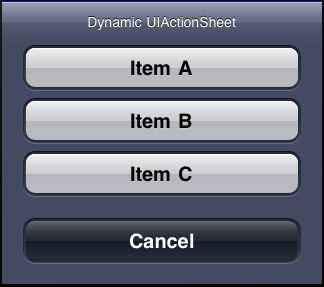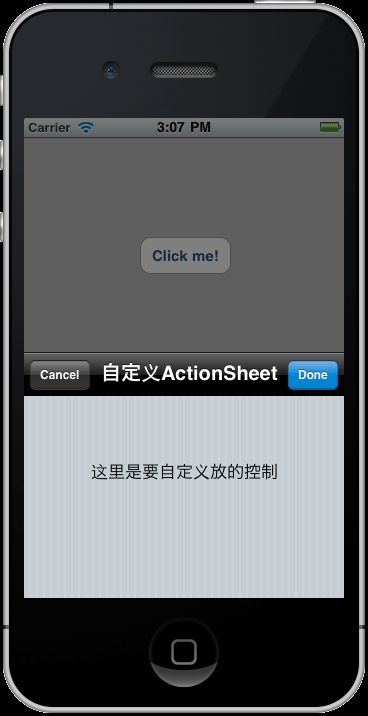iPhone开发之UIActionSheet
UIActionSheet是iOS开发中实现警告框的重要的类,在很多情况下都要用到,先来一睹其芳容:
实现步骤如下:
一、为了让控制器类充当操作表的委托,控制器类需要遵从UIActionSheetDelegate协议。
@interface UIActionSheetDemoViewController : UIViewController <UIActionSheetDelegate>{
}
二、生成UIActionSheet并显示。
UIActionSheet *actionSheet = [[UIActionSheet alloc] initWithTitle:@"Are you sure?"
delegate:self
cancelButtonTitle:@"No way!"
destructiveButtonTitle:@"Yes, I'm sure."
otherButtonTitles:@"Button One", @"Button Two", nil];
[actionSheet showInView:self.view];
[actionSheet release];
三、点击按钮后的事件。
- (void)actionSheet:(UIActionSheet *)actionSheet clickedButtonAtIndex:(NSInteger)buttonIndex {
NSLog(@"%i", buttonIndex);
if (buttonIndex == actionSheet.cancelButtonIndex) {
return;
}
switch (buttonIndex) {
case 0: {
NSLog(@"Item 1 Selected");
break;
}
case 1: {
NSLog(@"Item 2 Selected");
break;
}
case 2: {
NSLog(@"Item 3 Selected");
break;
}
}
}
代码样例请下载:http://download.csdn.net/detail/flyter/4274695
下面说说如何动态地添加UIActionSheet按钮。
一、UIActionSheet的通常实现方法:
- (void)testActionSheetStatic {
UIActionSheet *sheet = [[UIActionSheet alloc] initWithTitle:@"Static UIActionSheet"
delegate:self
cancelButtonTitle:@"Cancel"
destructiveButtonTitle:nil
otherButtonTitles:@"Item A", @"Item B", @"Item C", nil];
[sheet showFromRect:view.bounds inView:view animated:YES];
[sheet release];
}
二、 如果事先知道各个按钮并且再也不会改变的情况下,这样的实现是OK的。但如果我要在运行时改变应该怎么办呢?动态添加按钮看起来应该也很简单,不要init函数中指定而在之后添加可以了,如下代码就展示了这点。
- (void)testActionSheetDynamic {
// 创建时仅指定取消按钮
UIActionSheet *sheet = [[UIActionSheet alloc] initWithTitle:@"Dynamic UIActionSheet"
delegate:self
cancelButtonTitle:@"Cancel"
destructiveButtonTitle:nil
otherButtonTitles:nil];
// 逐个添加按钮(比如可以是数组循环)
[sheet addButtonWithTitle:@"Item A"];
[sheet addButtonWithTitle:@"Item B"];
[sheet addButtonWithTitle:@"Item C"];
[sheet showFromRect:view.bounds inView:view animated:YES];
[sheet release];
}
运行下就发现问题很明显——取消按钮是在视图的顶部,而标准做法是显示在底部。怎么解决呢?如果在init函数中添加取消按钮就无法解决了。最后找到了一种将取消按钮也动态添加。
- (void)testActionSheetDynamic {
// 创建时不指定按钮
UIActionSheet *sheet = [[UIActionSheet alloc] initWithTitle:@"Dynamic UIActionSheet"
delegate:self
cancelButtonTitle:nil
destructiveButtonTitle:nil
otherButtonTitles:nil];
// 逐个添加按钮(比如可以是数组循环)
[sheet addButtonWithTitle:@"Item A"];
[sheet addButtonWithTitle:@"Item B"];
[sheet addButtonWithTitle:@"Item C"];
// 同时添加一个取消按钮
[sheet addButtonWithTitle:@"Cancel"];
// 将取消按钮的index设置成我们刚添加的那个按钮,这样在delegate中就可以知道是那个按钮
sheet.cancelButtonIndex = sheet.numberOfButtons-1;
[sheet showFromRect:view.bounds inView:view animated:YES];
[sheet release];
}
这样取消按钮就显示在底部并且行为也符合预期了。
对我来说现在剩下的最大一个疑问就是destructive按钮到底是什么(Apple文档也没有清晰地说明这点)?一些实验结果也表明它实际上和 取消按钮并无区别,只不过它有一个红色背景而不是黑色的。所有如果在上例中改变destructiveButtonIndex而不是 cancelButtonIndex,就可以看到标有“取消”的按钮有红色背景了。
三、出于完整性的考虑,和上述代码相匹配的delegate代码如下:
- (void)actionSheet:(UIActionSheet *)actionSheet clickedButtonAtIndex:(NSInteger)buttonIndex
{
if (buttonIndex == actionSheet.cancelButtonIndex) {
return;
}
switch (buttonIndex)
{
case 0: {
NSLog(@"Item A Selected");
break;
}
case 1: {
NSLog(@"Item B Selected");
break;
}
case 2: {
NSLog(@"Item C Selected");
break;
}
}
}
最后说说如何自定义一个UIActionSheet类。
一、自定义CustomActionSheet类。
CustomActionSheet类继承UIActionSheet,具体的实现如下所示:
(1)CustomActionSheet.h头文件:
#import <UIKit/UIKit.h>
@interface CustomActionSheet : UIActionSheet {
UIToolbar* toolBar;
UIView* view;
}
@property(nonatomic,retain)UIView* view;
@property(nonatomic,retain)UIToolbar* toolBar;
-(id)initWithHeight:(float)height WithSheetTitle:(NSString*)title;
@end
(2)CustomActionSheet.m实现文件:
#import "CustomActionSheet.h"
@implementation CustomActionSheet
@synthesize view;
@synthesize toolBar;
-(id)initWithHeight:(float)height WithSheetTitle:(NSString*)title{
self = [super init];
if (self) {
int theight = height - 40;
int btnnum = theight/50;
for(int i=0; i<btnnum; i++){
[self addButtonWithTitle:@" "];
}
toolBar = [[UIToolbar alloc] initWithFrame:CGRectMake(0, 0, 320, 44)];
toolBar.barStyle = UIBarStyleBlackOpaque;
UIBarButtonItem *titleButton = [[UIBarButtonItem alloc] initWithTitle:title
style:UIBarButtonItemStylePlain
target:nil
action:nil];
UIBarButtonItem *rightButton = [[UIBarButtonItem alloc] initWithTitle:@"Done"
style:UIBarButtonItemStyleDone
target:self
action:@selector(done)];
UIBarButtonItem *leftButton = [[UIBarButtonItem alloc] initWithTitle:@"Cancel"
style:UIBarButtonItemStyleBordered
target:self
action:@selector(docancel)];
UIBarButtonItem *fixedButton =
[[UIBarButtonItem alloc] initWithBarButtonSystemItem:UIBarButtonSystemItemFlexibleSpace
target:nil
action:nil];
NSArray *array =
[[NSArray alloc] initWithObjects:leftButton,fixedButton,titleButton,fixedButton,rightButton,nil];
[toolBar setItems: array];
[titleButton release];
[leftButton release];
[rightButton release];
[fixedButton release];
[array release];
[self addSubview:toolBar];
view = [[UIView alloc] initWithFrame:CGRectMake(0, 44, 320, height-44)];
view.backgroundColor = [UIColor groupTableViewBackgroundColor];
[self addSubview:view];
}
return self;
}
-(void)done{
[self dismissWithClickedButtonIndex:0 animated:YES];
}
-(void)docancel{
[self dismissWithClickedButtonIndex:0 animated:YES];
}
-(void)dealloc{
[view release];
[super dealloc];
}
@end
二、利用自定义的CustomActionSheet类显示提示框。
-(IBAction)doClick:(id)sender{
CustomActionSheet* sheet = [[CustomActionSheet alloc] initWithHeight:284.0f
WithSheetTitle:@"自定义ActionSheet"];
UILabel* label = [[UILabel alloc] initWithFrame:CGRectMake(0,50, 320, 50)];
label.text = @"这里是要自定义放的控制";
label.backgroundColor = [UIColor clearColor];
label.textAlignment = UITextAlignmentCenter;
[sheet.view addSubview:label];
[sheet showInView:self.view];
[sheet release];
}
演示:
代码样例请下载:http://download.csdn.net/detail/flyter/4274763




